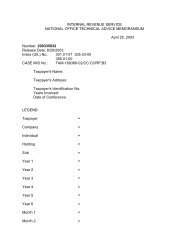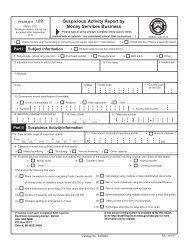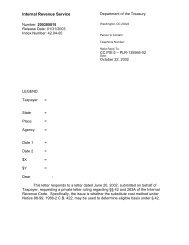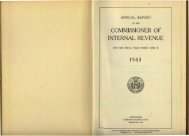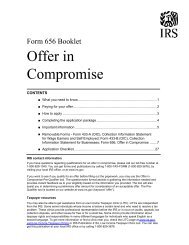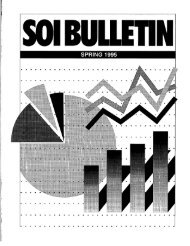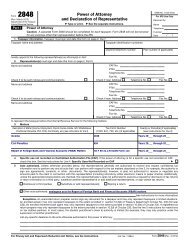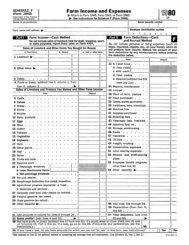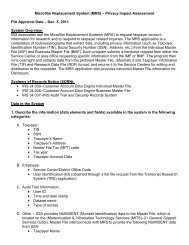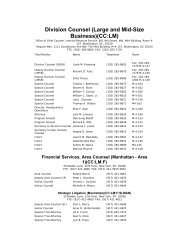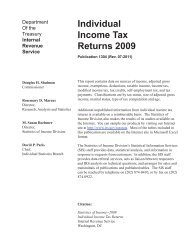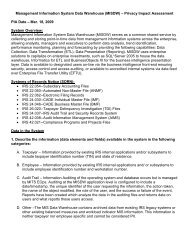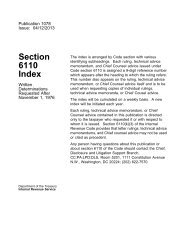1949 - Internal Revenue Service
1949 - Internal Revenue Service
1949 - Internal Revenue Service
Create successful ePaper yourself
Turn your PDF publications into a flip-book with our unique Google optimized e-Paper software.
S<br />
REPORT OF COMMISSIONER OF INTERNAL REVENUE<br />
REPORT OF COMMISSIONER OF INTERNAL REVENUE 9<br />
INCOME TAX CONVENTIONS AFFECTING THE BUREAU OF INTERNAL REVENUE<br />
PROMULGATED DURING THE FISCAL YEAR <strong>1949</strong><br />
A convention between the United States of America and the Kingdom<br />
of the Netherlands for the avoidance of double taxation and<br />
the prevention of fiscal evasion with respect to taxes on income and<br />
certain other taxes was proclaimed by the President on December 8,<br />
1948. This convention was effective as of January 1, 1947.<br />
A convention between the United States and Denmark for the<br />
avoidance of double taxation and the prevention of fiscal evasion<br />
with respect to taxes on income was proclaimed by the President on<br />
December 8, 1948. This convention was effective as of January 1,<br />
1948.<br />
IMPORTANT LEGISLATION ENACTED DURING THE FISCAL YEAR <strong>1949</strong> AFFECTING<br />
THE BUREAU OF INTERNAL REVENUE<br />
EIGHTIETH CONGRESS, SECOND SESSION<br />
Public Law 864, approved July 1, 1948, amends Title III of the,<br />
National Housing Act, as amended, so as to provide in section 304<br />
thereof that the Federal National Mortgage Association, including its<br />
franchise capital, reserves, surplus, mortgage loans, income, and<br />
stock, shall be exempt from all taxation now or hereafter imposed by<br />
the United States.<br />
Public Law 869, approved July 1, 1948, amends section 812(e)(1)(G)<br />
of the <strong>Internal</strong> <strong>Revenue</strong> Code (relating to the marital deduction for<br />
estate tax purposes in the case of life insurance with power of appointment<br />
in the surviving spouse) by expanding the application of<br />
the provision to include cases where insurance proceeds are held by<br />
the insured subject to an agreement to pay only interest thereon<br />
annually or at more frequent intervals and cases where interest is to<br />
be paid for a period and installments of the proceeds are to be paid<br />
for a period. The amendment also extends the application of the<br />
provision to annuity and endowment contracts, and to proceeds<br />
under an insurance contract upon the life of a person other than the<br />
decedent where the insured survives the decedent. The amendment,<br />
which is applicable with respect to estates of decedents dying after<br />
December 31, 1947, also makes certain clarifying and technical<br />
changes in section 812 (e)(1)(G).<br />
Public Law 899, approved July 3, 1948, amends section 3154(a) of<br />
the <strong>Internal</strong> <strong>Revenue</strong> Code by adding thereto a provision requiring<br />
the Commissioner of <strong>Internal</strong> <strong>Revenue</strong> to refund or credit to any<br />
brewer taxes paid by him on beer, ale, and similar fermented malt<br />
liquor which was lost in bottling operations, such refund or credit for<br />
any calendar month not to exceed 2% percent of the tax paid by the<br />
brewer on all beer, etc., removed during such month from his brewery<br />
to his bottling house. It also amends section 3154(b) of the Code to<br />
provide that no claim resulting from a loss from bottling operations<br />
shall be allowed unless made within 90 days after the close of the<br />
month within which such loss occurred. This amendment is applicable<br />
only with respect to beer, etc., which is lost after July 1, 1948.<br />
It also amends section 3404(d) of the Code so as to exempt from the<br />
tax on musical instruments those sold for the use of religious or nonprofit<br />
educational institutions for exclusively religious or educational_<br />
purposes. Public Law 899 also amends section 3443(a)(3)(A)(i) of<br />
the Code so as to permit the allowance of a refund or credit of the<br />
tax on musical instruments to the manufacturer, producer, or importer<br />
thereof where such instruments are resold by any person for<br />
the use of any religious or nonprofit educational institution for<br />
exclusively religious or educational purposes.<br />
EIGHTY-FIRST CONGRESS, FIRST SESSION<br />
Public Law 2, approved January 19, <strong>1949</strong>, provides for expense<br />
allowances for the President, the Vice President, and the Speaker of<br />
the House of Representatives in the amounts of $50,000, $10,000, and<br />
$10,000 per annum, respectively, and provides that no tax liability<br />
shall accrue with respect to such allowances. These provisions are<br />
effective at noon on January 20, <strong>1949</strong>.<br />
Public Law 4, approved February 3, <strong>1949</strong>, extended through June<br />
30, <strong>1949</strong>, the applicability of Public Law 769 (Eightieth Congress),<br />
approved June 25, 1948, which provides that certain articles donated<br />
by the people or Government of France for sale for charitable purposes<br />
in the United States may be entered, or withdrawn from warehouse,<br />
for consunption free of customs duties and internal revenue taxes.<br />
Public Law 33, approved March 31, <strong>1949</strong>, provides that the import<br />
tax imposed under section 3425 of the <strong>Internal</strong> <strong>Revenue</strong> Code shall<br />
not apply with respect to articles (other than copper sulphate and<br />
other than composition metal provided for in paragraph 1657 of the<br />
Tariff Act of 1930, as amended, which is suitable for processing into<br />
castings) entered for consumption or withdrawn from warehouse for<br />
consumption during the period beginning April 1, <strong>1949</strong>, and ending<br />
with the close of June 30, 1950.<br />
Public Law 35, approved March 31, <strong>1949</strong>, amends section 3469(a)<br />
of the <strong>Internal</strong> <strong>Revenue</strong> Code, relating to the tax on transportation of<br />
persons, so as to provide that a port or station within Newfoundland<br />
shall not be considered a port or station within Canada for the purposes<br />
of the provision exempting from tax certain foreign travel except any<br />
part thereof which is from any port or station within the United States,<br />
Canada, or Mexico, to any other port or station within the United<br />
States, Canada, or Mexico.<br />
Public Law 72, approved May 24, <strong>1949</strong>, by section 120 amends section<br />
2411 of title 28, United States Code, so as to restore provisions<br />
relating to interest on judgments against the United States or collectors<br />
of internal revenue for overpayments of internal revenue taxes, which<br />
provisions had been omitted when title 28 was enacted into law by<br />
Pubhc Law 773 (Eightieth Congress), approved June 25, 1948.<br />
Section 128 of Public Law 72 amends section 1141(a) of the <strong>Internal</strong><br />
<strong>Revenue</strong> Code by substituting "courts of appeals" for "circuit courts<br />
of appeals and the United States Court of Appeals for the District of<br />
Columbia."<br />
Public Law 76, approved May 27, <strong>1949</strong>, provides by section 144<br />
that the Assessor of the District of Columbia, or his duly authorized<br />
representatives, is authorized and empowered to request mformation<br />
from the Bureau of <strong>Internal</strong> <strong>Revenue</strong> relative to any person for the<br />
purpose of assessing the sales tax imposed by Title I of such law, and<br />
that the Bureau is authorized and required to supply such information<br />
as may be requested for such purpose.


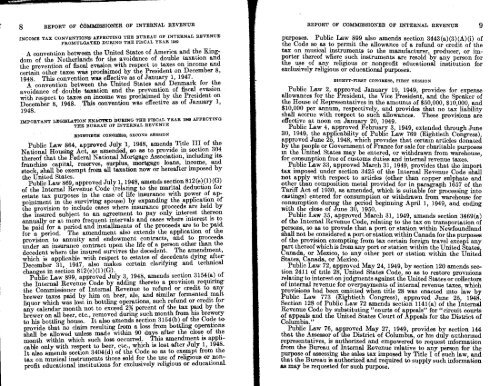
![l..l.l.L. 4DB.DI3-l]t] xxxxxxxxxxxxxxxx - Internal Revenue Service](https://img.yumpu.com/51302394/1/190x245/llll-4dbdi3-lt-xxxxxxxxxxxxxxxx-internal-revenue-service.jpg?quality=85)
